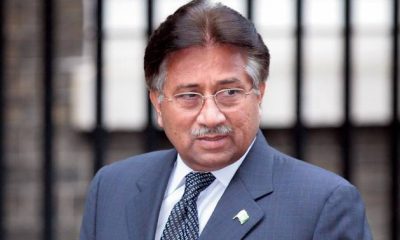World
Gen. Raheel Sharif helped me out in leaving Pakistan: Musharraf
Islamabad: Former Pakistan President General Pervez Musharraf has claimed that ex-army chief Gen Raheel Sharif helped him leave the country by keeping the government from pressuring the courts.
Participating in a talk show on Dunya News on Monday night, he said: “Well he (Raheel Sharif) did help me. I have been his boss and I have been the Army Chief before him… he helped out, because the cases are politicised, they put me on the ECL, they turned it into a political issue.”
When asked to explain how the recently retired army chief helped him, Musharraf said Gen Sharif played a role in “releasing the pressure” on courts to prevent him from leaving the country. “Behind the scenes, the army chief had a role to release that pressure by dealing with the government.”
“Once he (Gen Sharif) got the government to relieve the pressure that they were exerting, the courts gave their judgement and allowed me to go abroad for treatment,” Musharraf elaborated. Talking about his case, Musharraf said Pakistani courts “unfortunately… give decisions under pressure behind the scenes” and this pressure was relieved by Gen Sharif with an “influencing” role.
Musharraf had left the country for Dubai in March earlier this year hours after the interior ministry issued a notification to remove his name from the exit control list. The government notification followed the Supreme Court’s order to lift the ban on his foreign travel.
But the order from the top court had come with the rider that the federal government or the three-judge special court trying the retired general for treason was free to make decisions to regulate his custody or restrict his movement. Apart from murder cases of Benazir Bhutto, Nawab Akbar Bugti and Ghazi Abdul Rasheed, the retired general is facing treason charges for imposing emergency rule in November 2007, arresting judges and limiting their powers.
His name was kept on the exit control list for more than 20 months. Interior Minister Nisar Ali Khan had said in March that Musharraf had committed to facing all cases against him in court and had “promised to return in four to six weeks”.
World
Lockdowns in China Force Urban Communities to Defy Censorship and Vent Frustration Online

Shanghai’s rich middle class is leading a wave of online dissent over the strict and prolonged lockdowns imposed in various parts of the country. Chinese internet censorship is struggling as patience is wearing thin in many urban centers, coming up with creative forms of online protests.
Social Media Posts Revealing Lockdown Tension in Shanghai
Drawn-out lockdowns are nothing new in China as authorities insist with the nation’s zero-Covid policy since the start of the pandemic. Currently over This time around, however, metropolitan areas like Shanghai are increasingly difficult to keep quiet, given that its more than 25 million residents have seen weeks of total isolation along with food shortages and many other service interruptions.
Dozens of towns and reportedly over 300 million Chinese citizens have been affected by lockdowns of different severity. As expected, urban netizens have been most outspoken over their difficulties by finding creative ways to get around state censorship and bans placed on topics, news comments and spontaneous campaigns.
Shanghai residents have been using mobile proxies and hijacking seemingly unrelated hashtags to talk about healthcare issues, delivery failures and the overall severity of their situation. The “positive energy” that the Chinese government wants to transmit during the recent prolonged series of lockdowns does not come naturally to those counting food supplies and online censors are working hard to filter words, trending topics and undesired social media sharing.
WeChat groups and message threads are under constant monitoring. Posts questioning the zero-Covid approach have been quickly deleted, including by leading Chinese health experts like Dr. Zhong Nanshan. Video footage is soon censored and protests and investigations are quickly made to disappear.
Where this has not worked, officials have exposed banners with warnings and outright threats like “watch your own mouth or face punishment”, while drones have been patrolling the city skies. Yet, if anything, this has led to further tensions and unspoken confrontation with Shanghai’s educated and affluent middle class.
Creative Online Solutions Harnessing Civic Energy
Announcements by Chinese social media that they would be publishing the IP addresses of users who “spread rumors” have not helped either. Tech industry research has shown that much of Asia’s tech-savvy population has a habit of using mobile proxies and other privacy tools, quickly finding workarounds to browse the internet freely and talk to the world about the hottest topics.
The sheer volume of forbidden posts is already a challenge for the very censorship system, experts explain. Unable to track all trending hashtags, state workers overlook topics that speak about the US, Ukraine or other popular news. Linking human rights elsewhere to their situation, Chinese online dissidents establish their informal channels and “hijack” the conversation to share personal or publicly relevant information about the Covid suppression in their town.
Sarcastic and satirical posts still dominate. Others hope to evade the censors by replacing words from famous poems or the national anthem. One thing is certain – social media, when harnessed with the right creativity, has proven its ability to mount pressure on the government in even some of the most strictly controlled tech environments like China.

















